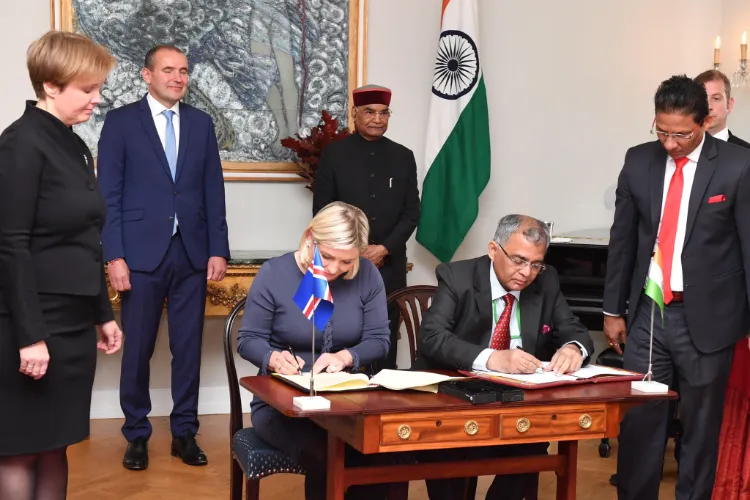
New Delhi
India and Iceland have agreed to step up cooperation in the fields of fisheries and aquaculture, focusing on sustainable blue growth, zero-waste interventions, and technology transfer, during a three-day high-level visit by an Indian delegation to Reykjavik from September 10-12, said an official.
According to the Ministry of Fisheries, Animal Husbandry & Dairying release, the visit aimed to strengthen bilateral cooperation between India and Iceland in the fisheries and aquaculture sectors through strategic partnerships, investment promotion, and the exchange of innovation.
On Wednesday, Likhi held a high-level meeting with senior representatives of the Iceland Ocean Cluster (IOC) in Reykjavik, where discussions focused on collaboration in developing fisheries and aquaculture clusters in India, particularly through zero-waste interventions.
The deliberations underscored the potential for leveraging Iceland's technological leadership in sustainable marine practices alongside India's expansive production capabilities. Both sides explored investment opportunities for the Icelandic seafood processing industry in India, along with ways to deepen business-to-business (B2B) linkages.
Emphasis was placed on innovation-driven cooperation in fish processing, value addition, traceability, and certification to enhance sustainability and competitiveness in the sector.
Senior officials from the National Fisheries Development Board (NFDB) presented India's vision for fisheries and aquaculture cluster development, highlighting opportunities in investment, innovation, and international collaboration. Icelandic companies, including BRIM and Hampidjan, along with the Iceland Ocean Cluster, shared insights into Iceland's pioneering zero-waste models and cutting-edge processing technologies.
The meeting also saw the participation of R Ravindra, Ambassador of India to Iceland, Embassy of India, Reykjavik, along with other senior officials from the Embassy of India in Reykjavik. At the same time, prominent Icelandic participants included Thor Sigfusson, Founder and Chairman of the Iceland Ocean Cluster, and Bala Kamallakharan, Founder of Startup Iceland.
Likhi also visited MATIS, a leading Icelandic food and biotech R&D company, where he was briefed on their work in food safety, biotechnology, and sustainable marine resource utilisation. The visit opened new avenues for collaboration in research and technology transfer to bolster India's fisheries value chain.
Meanwhile, on Tuesday, the Indian delegation visited the Icelandic Fishing Expo 2025 at Laugardalsholl in Reykjavik, where Likhi met with Hanna Katrin Fridriksson, Minister of Industry, Iceland. The two sides discussed developments in the fisheries and aquaculture sectors and explored opportunities for strengthening institutional and commercial ties.
The Indian delegation also interacted with leading Icelandic fishing associations, agencies, and entrepreneurs to learn about innovative technologies and best practices in sustainable fishing. In a separate thematic discussion, both sides identified several key areas for future cooperation, including the establishment of fisheries and aquaculture clusters with zero-waste interventions, and the deployment of deep-sea fishing vessels equipped with onboard processing facilities, transhipment capabilities, value addition mechanisms, and robust traceability and certification systems.
Emphasis was also laid on training and capacity building in deep-sea fishing technologies, alongside the adoption of advanced vessel monitoring and surveillance (VMS) systems to enhance regulatory oversight and resource management. Additionally, both sides explored collaboration in promoting trout farming, health management, and marketing in India's hilly states, as well as in developing specialised fishing technologies for tuna and tuna-like species in the Andaman & Nicobar and Lakshadweep Islands.
The visit marks a promising chapter in Indo-Icelandic cooperation and is expected to catalyse joint research, industrial partnerships, and innovation-led growth in the fisheries and aquaculture sectors.
According to the release, the Iceland Ocean Cluster (IOC) is an innovation and business network based in Reykjavik, Iceland, dedicated to promoting sustainable growth in the marine and ocean industries. Founded in 2011 by Thor Sigfusson, the cluster serves as a collaborative hub that brings together entrepreneurs, researchers, investors, and companies working across a wide range of sectors related to the ocean economy.
With a mission to promote better utilisation of ocean resources through innovation, sustainability, and the creation of new value chains, its focus is on 100% fish utilisation.
The Government of India has already adopted a cluster-based development model under the PMMSY to promote competitiveness and organised growth in fisheries and aquaculture. So far, 34 clusters have been notified across various States and Union Territories.
The cluster-based approach enhances competitiveness and efficiency by uniting geographically connected enterprises of all sizes, micro, small, medium, and large, across the entire value chain, from production to exports. This collaborative model improves financial viability through strong linkages, addresses value chain gaps, and creates new business opportunities and livelihoods.
By fostering partnerships and sharing resources, it aims to reduce costs, promote innovation, and support sustainable practices. The cluster-based development model brings together fishers, fish farmers, SHGs, JLGs, FFPOs, processors, vendors, cooperatives, transporters, start-ups, and other stakeholders. It is also supported through convergence with various ministries, including the Ministry of Food Processing Industries and MSME, as well as institutions such as NABARD.
ALSO READ: Guwahati's Dr. Yasin Ali treats Naga infant with innovative procedure
So far, 34 clusters have been notified across the country.
